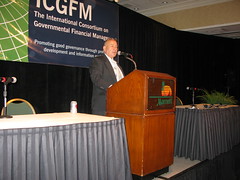 Stephen Lande, Adjunct Professor, Georgetown University School of Foreign Service and President of Manchester Trade discussed the lessons learned from financial crisis. Trade continues to be a major part of world economic activity and the source of much public revenue. Mr. Lande described how the reaction to the great depression was uncoordinated - building walls across boarders. The reaction to the 2008 financial meltdown has been coordination. There has been continuous consultations across G-20 countries. And, there has been general agreement on how to implement growth through Keysian economics.
Stephen Lande, Adjunct Professor, Georgetown University School of Foreign Service and President of Manchester Trade discussed the lessons learned from financial crisis. Trade continues to be a major part of world economic activity and the source of much public revenue. Mr. Lande described how the reaction to the great depression was uncoordinated - building walls across boarders. The reaction to the 2008 financial meltdown has been coordination. There has been continuous consultations across G-20 countries. And, there has been general agreement on how to implement growth through Keysian economics.Many countries reacted to the financial meltdown by considering protectionism. For example, members of the US Congress talked about a "buy America" policy for the stimulus package.
The WTO was able to show that protectionism restricts growth and financial stability. A report in March 2009 showed that there was no indication of any pattern of protectionist measures.
World Trade fell in 2009 because of global supply chains. There was a shortage of trade finance. Mr. Lande presented the relative rate of growth in 2009. He suggests that there is a new power balance with growth in developing countries by 5.6% vs. 0.8% in developed countries. China has emerged as the leader of world recovery. African countries also escaped the worse effects. Economic reforms in African countries enabled absorbing shocks better. Countries that relied on manufactured goods were hit by reduced exports.
Countries were able to avoid many potential negative effects of the financial meltdown because of coordination and good practices, according to Mr. Lande. He speculated on what this means to the United States, Africa and Latin America. He warned that the Greek crisis and the heated growth in China could have future negative ramifications.
Mr. Lande spoke about the has the duty free/quota free treatment from least developing countries. There has been some reaction to this from developed country textile industries. He disagrees with the notion of "least developing countries" because it was never meant for trade. He advocates that duty free/quota free should apply to all countries in Africa, yet 13 of them are not considered least developed countries.
Stephen Lande is viewed by many to be the "Father” of both the US Generalized System of Preferences (GSP) and the Caribbean Basin Initiative (CBI), and an early force in creating the North American Free Trade Agreement (NAFTA) is a distinguished international trade expert in the United States. Mr. Lande is Adjunct Professor at Georgetown University School of Foreign Service, and has lectured widely in Africa, Latin America, Europe, and Asia.





No comments:
Post a Comment